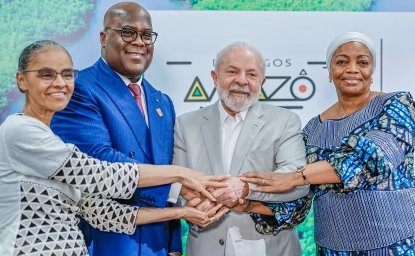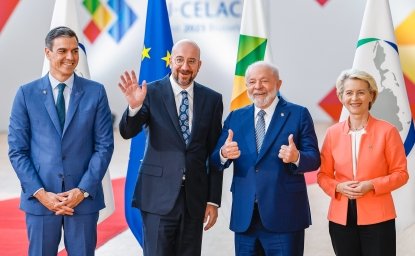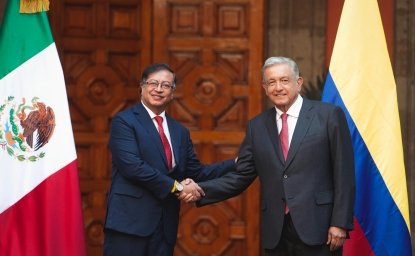Travel at Your Own Risk: Mexico’s AMLO Comes to Washington

Last week, in the first foreign trip of his presidency, Mexican President Andrés Manuel López Obrador traveled to Washington, D.C., to meet with President Donald Trump. To help make sense of the visit, our experts and a special guest, Mexico Institute Global Fellow and Former Mexican Ambassador to the United States Arturo Sarukhan, discuss the state of bilateral relations, the significance of the meeting for both leaders, and what was lost and gained from the visit.
Available on Spotify; SoundCloud; Apple Podcasts
Listen to Previous Episodes of Americas 360
Duncan Wood
- "If we look at what the meeting was actually supposed to be about... which was a celebration of USMCA, then there was one thing that was obviously missing there, and that was Canada."
- "This was a visit that was classified as highly risky by most political commentators. Many people thought that perhaps President Trump might say something that would be insulting to the Mexican president or, at the very least, that AMLO himself would suffer in the opinion polls."
- "Both President Loprez Obrador and President Trump seem to have gotten what they wanted from this meeting."
Christopher Sands
- "I think Trudeau was a little peeved at the United States for threatening to revive 232 national security tariffs on Canadian aluminum on the same day that USMCA took effect... this was something thst they expected they would never see again."
Cynthia Arnson
- "Mexican public opinion [of the United States] was sharply offended and negative in light of the different attacks by President Trump, but after USMCA was signed, the shift in favourability was quite notable... I think that speaks to this central importance of the trade relationship between the two countries."
- "It seems to me there's no question that President Trump will use this visit as part of his reelection campaign in November... Here's an example of a critical trading relationship in which he has hammered another government and gotten a better deal for the United States. I think that's the way that it will be portrayed."
Benjamin Gedan
- "There's an acknowledgement in Mexico of [the country's] dependence on the United States... there's recognition that the relationship is too important to pick a fight with the United States or to even return fire when Mexico's pride is offended by the rhetoric or actions of the White House. I think AMLO's approach really does reflect that."
Ricardo Zúñiga
- "One thing that strikes me is that AMLO has this grandiose view of his role in Mexican history, but a very humble view of his role in terms of politics in the region, including in the hemisphere and let alone in Latin America."
- "Of course USMCA is vitally important... But the reality is that a lot of the press coverage and a lot of commentary around that visit didn't really focus on some of the crucial trends and concerns that are emerging in Mexico."
Arturo Sarukhan
- "I think it was very important for... the Mexican President – in what I think was a purely domestic politics driven trip to Washington – to send a message back home that he can engage in a constructive, respectful manner with Donald Trump."
Guests






Advisory Board Member, Mexico Institute, Wilson Center; Former Mexican Ambassador to the United States; Founder & President, Sarukhan + Associates

Mexico Institute
The Mexico Institute seeks to improve understanding, communication, and cooperation between Mexico and the United States by promoting original research, encouraging public discussion, and proposing policy options for enhancing the bilateral relationship. A binational Advisory Board, chaired by Luis Téllez and Earl Anthony Wayne, oversees the work of the Mexico Institute. Read more


Canada Institute
The mission of the Wilson Center's Canada Institute is to raise the level of knowledge of Canada in the United States, particularly within the Washington, DC policy community. Research projects, initiatives, podcasts, and publications cover contemporary Canada, US-Canadian relations, North American political economy, and Canada's global role as it intersects with US national interests. Read more


Latin America Program
The Wilson Center’s prestigious Latin America Program provides non-partisan expertise to a broad community of decision makers in the United States and Latin America on critical policy issues facing the Hemisphere. The Program provides insightful and actionable research for policymakers, private sector leaders, journalists, and public intellectuals in the United States and Latin America. To bridge the gap between scholarship and policy action, it fosters new inquiry, sponsors high-level public and private meetings among multiple stakeholders, and explores policy options to improve outcomes for citizens throughout the Americas. Drawing on the Wilson Center’s strength as the nation’s key non-partisan policy forum, the Program serves as a trusted source of analysis and a vital point of contact between the worlds of scholarship and action. Read more


Brazil Institute
The Brazil Institute—the only country-specific policy institution focused on Brazil in Washington—aims to deepen understanding of Brazil’s complex landscape and strengthen relations between Brazilian and US institutions across all sectors. Read more


Argentina Project
The Argentina Project is the premier institution for policy-relevant research on politics and economics in Argentina. Read more

Related Episodes
Browse all episodes
Brazil and the Future of the Amazon

Europe and the Americas: The Road Ahead for Transatlantic Cooperation

LGBTQ+ Rights in the Americas: Progress and Remaining Challenges
